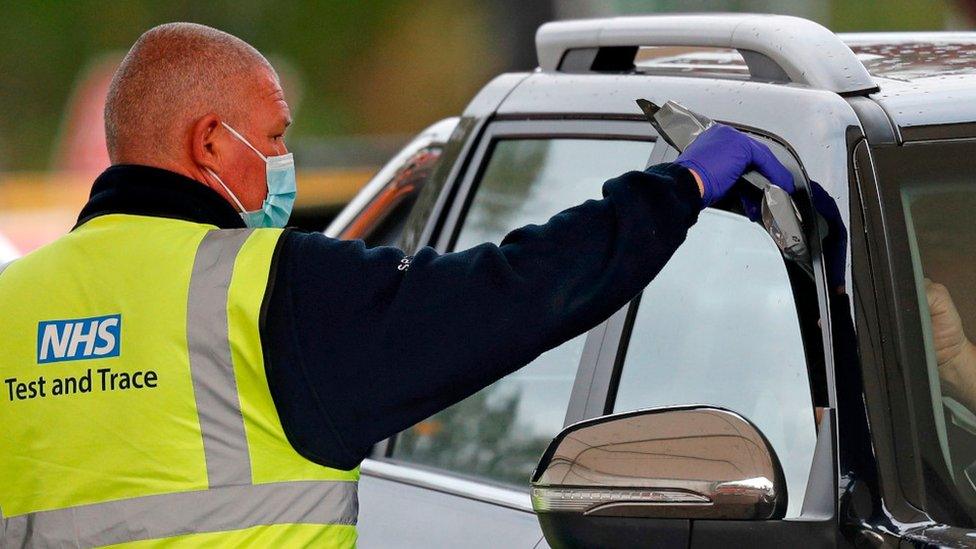How much is Covid costing the UK and how will we pay?
- Published
- comments

Queuing for a vaccination in London
As the country starts to emerge from lockdown, the impact it has had on the economy is becoming clearer.
The damage is enormous, but not as bad as feared last year, partly because the vaccines have been so effective.
How much will coronavirus cost the UK?
The government has had to spend many billions of pounds to fight coronavirus and protect the economy. The lockdown has reduced the amount of money the government raises in taxes.
This has meant the government has had to borrow huge sums of money.
In the first year of the pandemic, from April 2020 to 2021, it borrowed £299bn, the highest figure since records began in 1946.
The government is expected to borrow less in the current year, April 2021 to 2022, though the figure could still be more than £200bn.

Fighting Covid-19 has cost hundreds of billions of pounds
Where did the money go?
Over £100bn is being spent on support for jobs, such as the furlough scheme, where the government steps in to pay most of workers' wages.
The NHS and other public services have been given extra money to pay for the costs of fighting the pandemic.
However, the pandemic has reduced the amount the government raises in tax.
Unemployed or furloughed workers pay less income tax, businesses pay less tax if their profits are lower, and shoppers pay less VAT if they buy fewer things.
With more money going out and less coming in, the government has only one option - to borrow.
The pandemic will still mean more government spending and less tax coming in for years to come.
All of this means more borrowing.

As the economy reopens the government is spending less on support measures
Is the impact of the pandemic as bad as expected?
No-one knew how the pandemic would affect the economy so all predictions were full of uncertainty.
In recent months, however, the government has been borrowing less than expected as the economy starts to reopen. It has borrowed £53bn this year, £14bn less than forecast in March.
Also far fewer people will lose their jobs in the pandemic than had been feared.
Will taxes go up?
The government cannot keep borrowing at this level forever, so it must find a way to cut spending or increase taxes.
Before it was elected in 2019, the government promised not to raise the rates of the three biggest taxes - income tax, National Insurance or value added tax.
However, in March the chancellor announced measures which will increase most people's tax bills next year.
The amount you can earn without paying tax - known as the personal allowance - will stay the same from 2022 to 2026, instead of the usual small increases.
The amount people can earn before paying 40% instead of 20% will also be frozen.
Businesses will also pay more tax, as the rate of tax on their profits - corporation tax - will rise from 19% to 25% in 2023.

Will the government cut spending?
Spending in some areas, such as schools and the NHS, has been protected - and it would be difficult to reduce health spending after a pandemic.
State pensions, another big spending item, are protected by the so-called triple lock, which guarantees they rise with workers' earnings, prices, or 2.5% every year - whichever is highest.
The Conservatives promised to keep this, but earnings are rising very fast as they bounce back after the pandemic, which could make it a very expensive pledge to honour next year.
Last year, the chancellor announced some measures to reduce public spending, such as a controversial decision to freeze pay for many public sector workers.
He also cut the amount the UK spends on overseas aid, despite an election pledge to keep it at 0.7% of national income.
Can the UK afford all this debt?
Until recently, the government has been able to borrow easily at very low interest rates, which has made its debt more affordable.
At the moment it pays just 0.77% interest to borrow for 10 years.
It's still low but interest rates have been rising recently - and the higher they go, the harder it will be to support the UK's debt burden.
And in any case, interest payments will weigh on future generations until the debt is paid off, meaning there is less money available for public services, or tax cuts.

LOCKDOWN LOOK-UP: The rules in your area
SOCIAL DISTANCING: How have rules on meeting friends changed?
SUPPORT BUBBLES: What are they and who can be in yours?
FACE MASKS: When do I need to wear one?
TESTING: How do I get a virus test?
